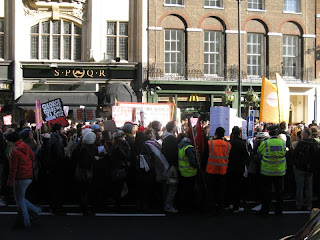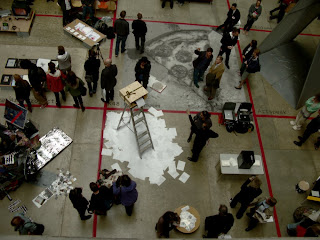
http://www.comatonse.com/releases/soulnessless/
Assuming, as the Oxford Dictionary states, that a Paradox is a “proposition that, despite sound reasoning from acceptable premises, leads to a conclusion that seems logically unacceptable or self contradictory” and democracy is a system of government by the whole population, what is contradictory about the rule of the many? This is the starting point of Mouffe’s analyses, that the Modern Democratic project poses a threat to democracy itself.
By criticizing the supposed essence, i.e. permanent nature, of liberal democracy Mouffe builds an argument for a radical pluralist democracy.
Pluralism as the dissolution of the markers of certainty (a notion that Mouffe takes from Lefort) legitimates conflict and division and proposes equality. The modern liberal democracy accepts pluralism, but this is taken as irrelevant and relegated to the private sphere as differences being mere facts, but Mouffe argues that pluralism is a not a fact but a valuable principle that should be enhanced and not hidden. Nonetheless if pluralism is to be celebrated it is also presented with limits, Mouffe does not defend heterogeneity to an incommensurable point, she proposes a continuous challenging of the relations of subordination but not their extinction, for this relations help us building the “we” which is the construction she claims as holding the political dimension.
Then in order to understand the importance of conflict she shows the eradicable nature of power. Objectivity, i.e. identity, is perceived always in opposition to something outside itself, and that outside is what makes it perceptible, so is part of its nature, power is identity’s “constitutive outside”. Identity is consequently contingent and therefore no one can claim to represent the totality. Power relations will always be there, so democracy can not be about abolishing power and antagonism, therefore the question is how to transform antagonism and Power according to democratic values?
Liberal democracy by concealing pluralism instead of building institutions that could present antagonism (rivalry) in an agonistic (contestant) way creates a problem, this being the transformation of political adversaries into enemies; and by presenting its institutions solid as real buildings unlegitimates and irrationalizes any possible challenge. Since homogeneity is an illusion and consensus an impossibility, what Mouffe proposes is a continuous and permanent agonistic conflict that instead of trying to erase power, brings it to the fore so it can be challenged.
Terre Thaemlitz is not looking for consensus, he is not looking for political correctness. He affirms boldly in his performance: I hate all religions.
For he is not an atheist that tolerates others belief, he re-asserts:
- I hate all religions. Without exception. Yours too.
Here, in the first part of his project Soulessness: ROSARY NOVENA FOR GENDER TRANSITIONING, Thaemlitz is deconstructing is own religious upbringing, his catholic upbringing.
So when I speak against religion and spirituality, I do so not as a person with the rare luxury of a secular upbringing, but as a person who has struggled to overcome one's own spiritual programming, and who sees others struggling to do the same. I assure you, any harshness to my words rests in defensive panic, not arbitrary aggression. I do not stand proudly before you. I am laying prostrate, an anti-Holy Roller speaking in tongues, trying to catch my breath for one more kick and "Fuck you!" against the endless trample of faiths and superstitions framing my existence in this world from birth to death. I concede the inescapability of religious and spiritual dogma to one degree or another in all corners of life - from extremist religious militarism to the seemingly harmless transcendental pretenses of "soul music," ambient, new age, classical, pop, rock, folk, house... No matter how much I wish for the eradication of spiritual thinking, I have no faith in the possibility of an atheist society or godless world. I am truly without faith. In a media marketplace that demands soulness, I can only offer soulnessless.
Thaemlitz presents this project as lecture performances, directing the narrative in the first person, where theory and facts are interwoven, to a point where it does not really matter the veracity of the facts, they serve to grip the public to his narrative. He stands before the audience in drag, dressed as an old fashion schoolteacher, reading from his notes (which are transcribed in his website). Subsequently he projects a video, where the audio is of equal importance, we should not forget that he is mainly an audio artists. The performance started with this anecdote:
I lived in Oakland, California. Although I did not own a radio receiver, the wires in my studio acted as an antenna, filling the line noise with religious broadcasts from a local public-access radio station.
Some might call them messages from God.
I called them fucking annoying.
The grainy video tells the story of an encounter, or an heritage. A little figurine owned by his grandmother led him to a whole new reading of catholic dogmas, the sinless conception of christ, his death and ressurection. Through the wax figurine of the Virgin Mary displaying a large erected penis to the stained glass representation of the Piéta; Thaemlitz takes us on a journey of individual transubstantiation, not of blood into wine, but of female into male and back again.
The woman that engenders from her own body her sexual opposite, and dies to return to the female form. ROSARY NOVENA is transgender tale.
I use the concept of agonistic pluralism to present a new way to think about democracy which is different from the traditional liberal conception of democracy as a negotiation among interests and is also different from the model which is currently being developed by people like Jurgen Habermas and John Rawls. While they have many differences, Rawls and Habermas have in common the idea that the aim of the democratic society is the creation of a consensus, and that consensus is possible if people are only able to leave aside their particular interests and think as rational beings. However, while we desire an end to conflict, if we want people to be free we must always allow for the possibility that conflict may appear and to provide an arena where differences can be confronted. The democratic process should supply that arena. (MOUFFE, 2000)
I believe Thaemlitz is performing that arena. Presenting us with the affects of such liberal pluralist project that diverts conflict into an underground space, erupting violently on specific subjects, on him.
A limited inquiry into the influences of Catholicism in my own life would be a safer topic to discuss here, since anything less subjective could be labeled culturally insensitive, bad karma, anti-Semitic, demanding fatwah, or any number of other curses bestowed upon outsiders. I wish to limit the potential for such curses because I have already endured acts of verbal and physical violence at the hands of Christians, and suspect that fanatical followers of the other great religions of the world are no less capable of the same.
Thaemlitz voices dissent, he does not play the general tolerant model, that “forces the participants to leave aside all their particularities and interests.” (Mouffe, 2000, 87), the democratic tension is ineradicable and Thaemlitz performs it. Critic of spiritualism and the patriarchy society, he uses the symbol of the Virgin Mary, but has he states, not only as a possible feminist icon, but beyond that, as a gender trouble. Extremely critic, as well, of sexual transition through surgery, because in the end what happens is that we all conform to the old same binary of male female. The same old roles, the same old play. Thaemlitz ends the video with a hymn, sung to medical footage of vaginoplasty operation.
On that resurrection morning
When all dead in Christ shall rise
I'll have a new body (Praise the Lord)
I'll have a new life
Won't it be so bright and fair
When we meet our loved ones there
I'll have a new body (Praise the Lord)
I'll have a new life
I'll have a new home of love eternal
Where the redeemed of God will stand
There'll be no more sorrow (No more pain)
There'll be no more strife
Raised in the likeness of my savior
Ready to live in paradise
I'll have a new body (Praise the Lord)
I'll have a new life
When ol' Gabriel blows his trumpet
And we walk the streets of gold
I'll have a new body (Praise the Lord)
I'll have a new life
No more pain, worry, sorrow
In this wicked world of sin
I'll have a new body (Praise the Lord)
I'll have a new life
I'll have a new home of love eternal
Where the redeemed of God will stand
There'll be no more sorrow (No more pain)
There'll be no more strife
Raised in the likeness of my savior
Ready to live in paradise
I'll have a new body (Praise the Lord)
I'll have a new life
Oh dear brother are you livin'
For that day when Christ shall come
I'll have a new body (Praise the Lord)
I'll have a new life
Graves all burstin'
Saints a' shoutin'
Heavenly beauty all around
I'll have a new body (Praise the Lord)
I'll have a new life
This sex change, for her, levels down the necessary complexity of gender identities, and the tale of desire to embody the idealized shape is counter posed with the compulsory sex change that homosexuals have to go through in Iran when stating their homosexual preference openly.
Thaemlitz finishes her video presentation and opens the performance to questions from the audience. Again we can sense the opening up of that space for articulation of antagonism, but is society prepared to voice differences and still be able to break some bread afterwards? For Mouffe the goal is to transform antagonisms into agonism. “This requires providing channels through which collective passions will be given ways to express themselves over issues which, while allowing enough possibility for identification, will not construct the opponent as an enemy but an adversary.” (MOUFFE, 2000, p.103)
How can we construct society on this model, against the liberal notion of being a mere collection of individuals and interests groups? For Mouffe “the prime task is not to eliminate passions from the sphere of the public, in order to render rational consensus possible, but to mobilize those passions towards democratic designs.” (MOUFFE, 2000, p.104) We can hint the open up of that place of encounter, of dissent in Thamelitz work, but how will the democratic institutions that could embody society agonistic play, in large scale, look like? Thaemlitz is very pessimistic; she does not believe that there will be any substantial change, even though we can witness this change in her performance; so while not believing in change she is already performing that very same change. And even though we cannot envision the agonistic institutions that Mouffe argues for, where ‘conflictual consensus’ can be achieved, Thaemlitz is voicing out loud all that remains hidden, all that can be only uttered as private (here I mean as non public therefore almost as non political). Hers, as many other projects, is maintaining this possible agonistic pluralism, and therefore keeping “the democratic contestation alive” (MOUFFE, 2000, p.105). Thaemlitz performs democracy, but could it really be institutionalized, as Mouffe believes, in order to save democracy as a form of government and society, or is democracy something else, or better, lying somewhere else, ‘below and beyond’ state policy.
Mouffe argues that the common good is always something unreachable, is “a vanishing point, something to which we constantly refer when we are acting as citizens, but that can never be reached.” (MOUFFE, 1992, p.379) While for Rancière democracy is not a form of government nor a type of society, but egalitarian relations “that are traced here and now through singular and precarious acts,” is there is where we can spot democracy. (RANCIÈRE, 2006, p.96) Somehow their positions do not seem very different, but while Mouffe believes that change, even if precarious, can be achieved through governance, Rancière alert us to look at all that we consider today as democratic achievements, and how they were actually achieved outside the state framework, through people’s struggles and isolated acts.
My queries are these; what could an agonist democratic institution look like, and is it really necessary, or could democracy maintain itself on these temporary agonistic platforms, such as those provided by the arts? Moreover if democracy will never be a form of government but precarious single acts between equals, what is the role of organized social struggle and how can we envision different forms of community? What it seesm to happen in Thaemlitz work, for example is the possibility of different forms of community and empowerment within our oligarchic societies, done with the belief that nothing susbtancial will change, but it must be done anyhow. Although, I might accept that potential for change can be found in that articulation, I am still puzzled with the possibility of a truly democratic governance. But maybe I am down in the belief trap that Thaemelitz so violently urges us not to fall into.
NOVENA PRAYER (FOR NINE DAYS)
Hail, O Lady of Gender Transitioning, Holy Queen, Mother of Mercy, my hope!
To Thee do I send up my sighs, mourning and weeping in this valley of tears.
O Holy Mother, in this age when feminine napkins are sold by South Korean transgendered celebrity Harisu, as Your imitators we beseech Thee for humility.
Forgive her envy of menstruation as that which she is "jealous of and wishes to do as a woman," and forgive my envy of sexual reassignment surgery as that which I am jealous of and wish to do as a "man."
Bless me, as You have blessed her, in granting faithful imitation and homage to Thine sacred womb, to give birth to my gender opposite.
Bless me with Thine beauty and grace.
Bless me with the heavenly riches necessary to complete such a transformation.
May the financial success of this audio project serve as the sacred seed of my own menstruation, an idillic flow like that seen in tampon commercials, a holy blue flow reflecting the plasticity of gender transitioning, draping my legs like Your blessed blue robe, that I may follow in Thine image.
O Lady of Gender Transitioning, pray for this sinner now and at the hour of my death, and receive me in my resurrection. This I humbly pray in Your name. Amen.
CHANTAL MOUFFE is a Belgium political theorist, knowned exactly for this notion of the pluralist agonistic democracy. From her vast work she is better known for have writen Hegemony and Socialist Strategy: Towards a Radical Democratic Politics with the Argentinian political theorist Ernesto Laclau in 1985.
TERRE THAEMLITZ is “a multi-media producer, writer, educator, DJ and owner of the Comatonse Recordings record label. His work combines a critical look at identity politics - including gender, sexuality, class, linguistics, ethnicity and race - with an ongoing analysis of the socio-economics of commercial media production. This diversity of themes is matched by Thaemlitz' wide range of production styles, which include electroacoustic computer music, club oriented deep house, digital jazz, ambient, and computer composed neo-expressionist piano solos.”
 http://www.comatonse.com/thaemlitz/gigs.html
http://www.comatonse.com/thaemlitz/gigs.html
Thaemlitz is both addressed as male and female throughout this paper both because his own appearance in drag in the performances and her self address in her website are always in between male / female binary, therefore I used the hymn of gender transition to do the linguistic change on Thaemlitz, in lack of a better tool to convey her own gender troubling in a society where one can still not be gender neutral.
MOUFFE, C (1992) Feminism, Citizenship, and Radical Democratic Politics. In BUTLER, J. and SCOTT, J. W. 1992. Feminist Theorize the Political. Routledge.
MOUFFE, C. (2000) The Democratic Paradox. London, New York. Verso.
RANCIÈRE, J. 2006. Hatred of Democracy. Verso.
THAEMLITZ, T. (2009) http://www.comatonse.com/writings/becoming-minor.html (01.05.2010)













































